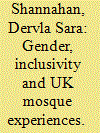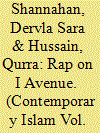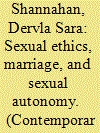|
|
|
Sort Order |
|
|
|
Items / Page
|
|
|
|
|
|
|
| Srl | Item |
| 1 |
ID:
131475


|
|
|
|
|
| Publication |
2014.
|
| Summary/Abstract |
Access to, management and attendance of places of worship often takes gendered forms. Gender imbalances in UK mosques manifests in attendance and management patterns and is reflected in the facilities available. The sense that mosques are perceived widely as 'prayer-clubs for men' (Maqsood 2005: 4-5) is often reflected in the physical spaces and facilities made available to female worshippers, and it must be noted that some mosques do not provide any of the latter at all (Dispatches 2006). Shockingly, a recent survey found that 'women form part of the congregation in [only] half (51%) of the organisations surveyed' (Coleman 2009: 10). Relatedly, UK Mosque management committees privilege male involvement, decision-making and leadership roles, with figures of as few as 15% women in management positions (Asim 2011: 34) and more who 'will simply not entertain the idea' (Asim 2011: 39). Such imbalances reflect the specificities of the UK-religious context (Maqsood 2005) yet, globally, women's mosque involvement appears to be changing far more rapidly than here. This paper explores how gender, religious identity and sexualities interface with women's mosque access, involvement and experiences therein. It draws upon original research with a sample of women, and indicates that inclusivity is an important topic in UK mosques, far beyond gender
|
|
|
|
|
|
|
|
|
|
|
|
|
|
|
|
| 2 |
ID:
102880


|
|
|
| 3 |
ID:
102934


|
|
|
|
|
| Publication |
2011.
|
| Summary/Abstract |
This paper presents research findings from fieldwork in the rap scene of Tunis. Although the scene is relatively small, especially when compared to its Algerian counterpart, the number of young men involved in rap is expanding rapidly, particularly with the internet as a networking and promoting tool. Throughout the discussion I explore some of the ways that (Sunni) Islam intersects with rap in the artists' lives, lyrics and identities, and the ways that their particular locatedness informs their position within what has been termed the 'transglobal hip hop nation'. Whilst interpreting religion has long been a contested area in Tunisia, it seems that rap here functions as a route to articulating alternative interpretations of Islam, ones which not only unite the artists but offer potential for pan-umma and transglobal connectivities. These potentialities resonate with the idea of a 'transglobal hip hop ummah' and provide the artists with arenas for personal, political, collective and spiritual expression.
|
|
|
|
|
|
|
|
|
|
|
|
|
|
|
|
| 4 |
ID:
087292


|
|
|
|
|
| Publication |
2009.
|
| Summary/Abstract |
Muslims today are increasingly re-examining gender and human rights in the light of Qur'anic teachings, and these issues crucially intersect in the terrain of sexual autonomy. The Qur'an insists that men and women are spiritually equal, yet dominant interpretations of sexual rights in Islam are not gender symmetrical. This paper asks whether Islam's depiction of sexuality and marriage allows a space for female, and non-heterosexual, sexual autonomy. It also explores current interpretations of Islam, sexuality and same-sex relationships amongst British Muslims who identify as Lesbian, Gay, Bisexual and Transgendered. Large issues are at stake for contemporary Muslims re-examining their institutions and identity. Does marriage remain authoritative when paradigms of sexuality shift, and what does this mean for sexual autonomy in the wider Muslim consciousness?
|
|
|
|
|
|
|
|
|
|
|
|
|
|
|
|
|
|
|
|
|